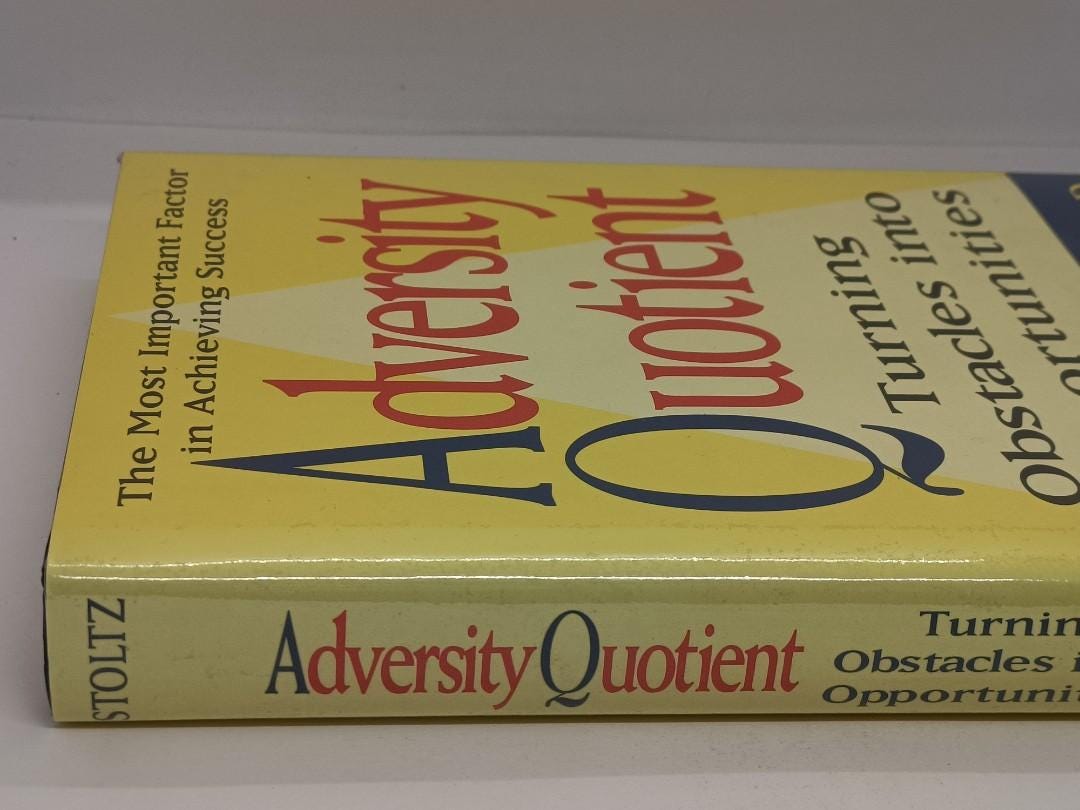“When everything seems to be going against you, remember that the airplane takes off against the wind, not with it.”
Henry Ford
Welcome to another edition of “Sebastian’s Leadership Reflections”
Today it’s about the adaptation and response to adversity, core to building resilience, through the concept of the “Adversity Quotient,” which is nearly as important -if not more- than your IQ and EQ.
All aircraft try to fly against the wind when taking off, the reasons being the physics of 1. action-reaction and 2. aerodynamics.
When taking off into the headwinds, the oncoming force on the wings causes an upward thrust, allowing the aircraft to actually become airborne at a lower speed. After takeoff, pilots will try to move fast to a route that provides a tailwind, pushing the plane along its path rather than pushing it back. However, the same original principle largely applies to planes returning to the ground as well. By landing into a headwind, the airframe is pushed back and slows down faster, allowing pilots to reach taxiing speeds much faster for a safer entry off the runway.
Reflect deeply on the insights of the text above and then extrapolate to your professional life. Take the time to think it through, the metaphor is rich.
Let me give you my take…
It is almost impossible to take full advantage of a new role or to lead a special project if we are not presented with “the stretch”, a set of challenging conditions that during “take-off” will help build the strength and endurance required to be on the driver seat. Once “in the air,” we will need to find some current of tailwinds to support us to learn new things as we go, manage difficult stakeholders and navigate politics in order to gain good forward momentum. However, and this is a big one, when it’s time to “land,” we will have to slow down, act more carefully, watch out for critical variables and refocus our attention on the fundamentals more than anything else. The goal now becomes first not to crash it! This is when we need to be open to honest feedback and welcome some headwinds to help things calm down, and avoid the risk of ‘Hubris’ born of (perceived and anticipated) success in such high-stakes moment!
below an important life lesson (from ‘How the Mighty Fall’, by Jim Collins)
Hubris Born of Success
Hubris is defined as excessive pride that brings down a hero or an outrageous arrogance or entitlement that inflicts suffering upon the innocent. Typically, when past accomplishment creates a sense of invulnerability and a guarantee of future success, hubris has set in. It is the false sense of security that we can create something from nothing
Adversity Quotient (AQ)
The C.O.R.E. Dimensions
Dr. Paul Stoltz introduced the concept AQ in 1997 when he published the book “Adversity Quotient: Turning Obstacles into Opportunities.”
In an uncertain and volatile world that demands leaders to demonstrate resilience and adaptability, it is essential to embrace adversity as a catalyst for growth.
While Emotional Quotient (EQ) and Intelligence Quotient (IQ) are widely recognized as crucial factors for success, AQ plays an equally vital role in shaping effective leadership behaviors. This metric gauges our capacity to navigate life's hurdles and obstacles effectively, grounded in four crucial dimensions known as CORE.
Control: Take charge, lead the way
Ownership: Be responsible, be accountable
Reach: Know when to seek support and how to ask for help.
Endurance: Persevere in adversity, persist through challenges.
The questions below help you frame the situation you deal with and evaluate how to overcome it:
CONTROL - To what extent can I influence whatever happens next?
OWNERSHIP - How likely I am to step up to do anything to improve the situation?
REACH - How far will the situation reach into and affect everything else?
ENDURANCE - How long will it take to get past this situation?
C.O.R.E.
1. Control: Take Charge!
Control is about your aptitude for managing situations and responses so you can focus on the aspects that can influence rather than succumbing to the overwhelming aspects beyond our control. By taking action and shaping our circumstances positively, we garner better results and an amplified sense of empowerment.
2. Ownership: Responsibility Reigns
Ownership reflects our knack for taking charge of our responses and actions. Rather than assigning blame to external factors or others for our challenges, we concentrate on proactive measures to ameliorate our situation. This shift fosters a heightened sense of self-efficacy and control over the course of our lives.
3. Reach: Seeking Support
Reach is the ability to seek out help and support when the going gets tough. It aids in establishing a network of supportive relationships and resources, which we can lean on during trying times. We evade isolation and the feeling of being overwhelmed by challenges by reaching out for guidance and support, allowing us to surmount obstacles effectively.
4. Endurance: Perseverance in Adversity
Endurance signifies our capacity to persevere through challenging periods and maintain a positive outlook, even when faced with adversity. This resilience helps us rebound from setbacks, nurturing a constructive attitude and outlook in the face of adversity. It equips us to confront challenges head-on and attain our objectives.
In our fast-paced, unpredictable world, resilience is a prized asset. The Adversity Quotient is a valuable instrument for fostering resilience, enabling us to cultivate the skills and mindset essential for overcoming obstacles and bouncing back from setbacks. Elevating our AQ renders us more adaptable, tenacious, self-aware, and better equipped to surmount any hurdles that life may present.
How to integrate the concept of AQ into our lives?
1. Embrace the Power of AQ:
Adversity is an inevitable aspect of life, and leadership is no exception. Leaders who possess a high AQ have the resilience to bounce back from setbacks, the agility to adapt to change, and the courage to take risks. They view adversity as an opportunity for growth and transformation, rather than a roadblock to success.
2. Build Resilience:
Resilience is the foundation of a strong AQ. To develop resilience, it is crucial to cultivate a growth mindset that sees setbacks as temporary and opportunities for learning. Embrace failure as a stepping stone to success and encourage your team to do the same. Foster a culture that values resilience, perseverance, and continuous improvement.
3. Seek Stretch and Discomfort:
Growth and comfort cannot coexist. To expand your AQ, step outside your comfort zone regularly. Engage in new experiences, take on challenging projects, and actively seek opportunities to learn and grow. Encourage your team to do the same, supporting them as they navigate through unfamiliar territory. Remember, true growth happens when we push beyond our perceived limits.
4. Cultivate Adaptability:
In today's rapidly changing world, adaptability is a key leadership trait. Embrace change as an opportunity for innovation and evolution. Encourage your team to adopt a flexible mindset, adapt to new technologies and market trends, and embrace change as a constant. By fostering adaptability, you position yourself and your team to thrive in any situation.
5. Learn from Setbacks:
Setbacks and failures provide valuable lessons if we are open to learning from them. Encourage a culture of reflection and continuous improvement within your team. After facing adversity, take the time to assess what went wrong, identify areas for growth, and develop strategies to overcome future challenges. Encourage your team members to share their learnings and insights, fostering a collective growth mindset.
6. Build a Supportive Network:
Surround yourself with individuals who inspire and challenge you to grow. Seek out mentors and peers who have demonstrated resilience and developed a strong AQ. Engage in meaningful conversations, seek advice, and learn from their experiences. Additionally, provide support and guidance to your team members, helping them develop their own AQ. Be open to reaching out for assistance to endure through difficult times.
Remember, developing your AQ is a long journey that requires patience, practice, and self-reflection, but if you use it as a catalyst for growth, you’ll watch your leadership potential soar to new heights.
I encourage you to reflect on your own AQ and identify areas for improvement. Embrace the challenges that come your way, because they are the stepping stones to your personal and professional growth.
“You may encounter many defeats, but you must not be defeated. In fact, it may be necessary to encounter the defeats, so you can know who you are, what you can rise from, how you can still come out of it.”
Maya Angelou
Not too long ago I heard someone in a tv show say “When a man faces death, he gains perspective. When a man faces down, he finds his soul.”
P.S. Before I go, here you have “The Treat,” where I share some of the music that kept me company while writing … Enjoy as you bid farewell to this post
“Lead yourself, Learn to live. Lead others, Learn to Build.”
If you enjoyed reading this post consider subscribing to the newsletter for free, joining the community and sharing your thoughts.








The Adversity Quotient is an interesting topic to discuss and build on on a personal level and in teams. First is bringing awareness to the possibility of adversity even in the most successful business or in the most optimistic person. How I personally develop it? I always consider the risk of something not going as planned and I analyze the consequences and come up with a Plan B. Same in business, building a team's AQ is discussing it within the team as the team builds and not only when faced with adversity. It's like a mental preparation of all possible scenarios. Does this makes sense?
Thank you for introducing the concept of AQ into my worldview, Sebastian! It’s a very captivating topic and I truly appreciated how you developed on different aspects of it. I think that the attitude is a key to facing anything that life throws our way. I like to think of the life journeys as experiments, so regardless of the outcome, we still learn a great deal about ourselves and the world. I find that such attitude helps face adversity in all its shapes. Excellent post! By the way, love how you end the post with a beautiful piece of music!